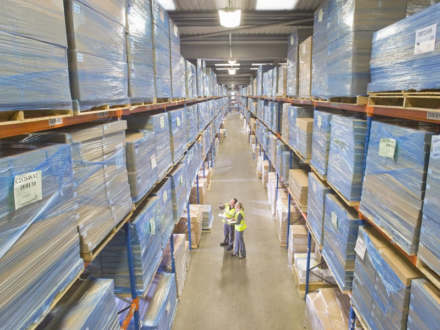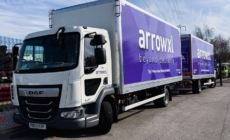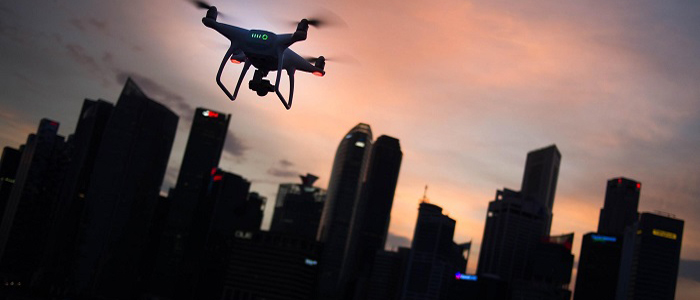-
ROSSLARE EUROPORT TARGETS HEALTH & SAFETY WITH CAMERA TELEMATICS PARTNERSHIP - July 25, 2024
-
Landmark Study Reveals Wearable Robotics Significantly Boost Safety and Efficiency in Industrial Environments - July 24, 2024
-
Visku Tackle The Retail Seasonality Challenge One Pallet At A Time - July 22, 2024
-
KAMMAC AND BERGEN LOGISTICS STRENGTHEN FASHION & LIFESTYLE SERVICES IN THE UK - July 19, 2024
-
TENTBOX EXTENDS PARTNERSHIP WITH ARROWXL TO SUPPORT INCREASING DEMAND - July 17, 2024
-
The Perfume Shop improves customer journeys while driving profitability in partnership with Scurri - July 17, 2024
-
ZEROMISSION SECURES £2.3M ($3M) INVESTMENT TO ACCELERATE ELECTRIC FLEETS - July 16, 2024
-
BCMPA CELEBRATES SUCCESS OF 2024 CONFERENCE - July 15, 2024
-
Best of the Best: Jungheinrich Celebrates Triple International Award Win - July 12, 2024
-
GOPLASTICPALLETS.COM CALLS ON NEW CHANCELLOR RACHEL REEVES TO CONSIDER PLASTIC PACKAGING TAX REFORM - July 10, 2024
Drones in Logistics
Redefining Supply Chain Management
Drones are disrupting industrial operations globally, as more and more companies jump onto the automation bandwagon by adopting autonomous technologies to gain a competitive edge. While the military and consumer applications of UAVs are well established, drones are now making rapid inroads in supply chain operations. Drones in logistics are driven by the continuous need for operational improvement and efficiency throughout the supply chain. With drone-based delivery becoming a reality, the global drone logistics and transportation market is projected to cross $20 billion in less than a decade.
Use-Cases
Drones in logistics serve multiple purposes, even for operations, and distribution:
- They are used in the transportation and delivery of packages to customers especially for the first and last-mile deliveries in urban areas. Deliveries of emergency medical aid to remote and rural areas is in fact a leading use-case for drones in supply chain.
- Insurance and risk assessment of supply chain infrastructure, after disasters, can be done quickly and efficiently using remotely-operated drone fleets.
- Drones are effective in security and surveillance of large spaces such as factories and warehouses – they can be deployed for inspection of warehouse roofs, yards and terminals.
- Drones can be deployed indoors for scanning pallets in distribution centers, viewing inventory stored on the ground, searching for misplaced items in hard-to-reach locations, and collecting image & video data for inventory audits.
Drones in distribution and transportation of goods are gaining importance, especially with the rise of e-commerce and delivery requirements. Nevertheless, they are restricted by hardware limitations such as battery life, payload capacity, and flight stability in windy conditions. Moreover, the regulatory and legislative aspects pertaining to privacy and safety issues remain a hurdle for widespread drone adoption for last-mile package delivery. This market segment of drones is a tremendous long-term commercial opportunity but will require a wide variety of stakeholders to collaborate in pilot projects, standardization efforts, and community initiatives.

Indoor use of drones for commercial purposes is not regulated in most geographies and hence offers an immediate opportunity to transform inventory management across the supply chain. Fleets of autonomous drones can perform rote, mechanical tasks with high speed and efficiency and alleviate risk to human life. Drone solutions can be customized and configured to seamlessly integrate with existing operational workflows at warehouses, distribution centers, fulfillment centers, air cargo operations and 3PL facilities.
Advantages of Using Drones in Logistics
Drones in logistics offer a compelling value proposition for the supply chain industry, with potential impact on top-line, bottom-line, employee safety, and customer satisfaction.
- Drones allow for greater accessibility and accuracy in operations such as inspection of supply chain infrastructure, cycle counting of warehouse inventory and monitoring of container yards. They can reach areas that humans find hard to reach – both outdoors and indoors.
- By reducing the need for expensive labor and equipment, drones can drive significant return on investment (ROI) with short payback periods, and additionally help mitigate risks w.r.t. employee attrition and shortage.
- Drones can gather video and image data – which can be analyzed using AI/ML for faster, automated operational decisions.
- Software-driven drone solutions are highly customizable and scalable, easy to integrate with existing warehouse management systems, and can be extended to private/public clouds for multi-party collaboration eg. between 3PL providers and their customers.
- Drone-based last-mile delivery is expected to drastically lower operational and shipping costs.
Adoption of Drones in Supply Chain
Companies are actively experimenting with drones for logistics. Resource-rich corporations like Amazon, Google, DHL and Walmart are heavily investing in long-term R&D of robotics and unmanned systems, while 3PLs are deploying drones to better comply with the SLAs they have in place with end customers. From annual regulatory audits to daily inventory counts, drones are helping bring automation and efficiency to warehouse operations – with minimal facility shut-downs and dependence on labor constraints. The exponential improvement in drone hardware in recent years has made it possible for intelligent automation software to leverage off-the-shelf, cost-effective drones for logistics and supply chain applications.
Warehouse Automation With Drones
For warehouses and DCs, the journey to adopt and implement autonomous drones in warehouses can start with FlytWare which combines intelligent software with reliable, off-the-shelf drone hardware. As a rapidly scalable solution for drones in warehousing, FlytWare adapts to a variety of pallet storage formats, barcodes, QR codes, and inventory counting processes. Autonomous FlytWare drones have been successfully deployed in VNAs, long aisles, and tall racks at logistics facilities in the US and Europe.

































